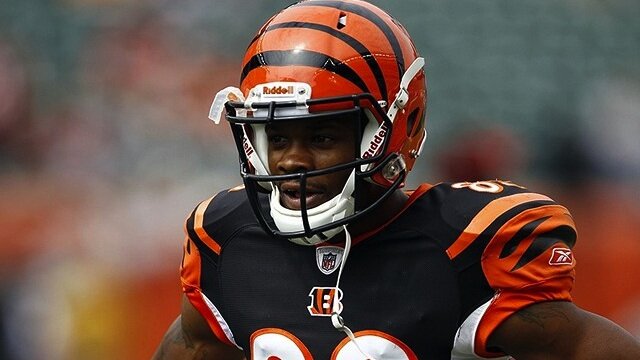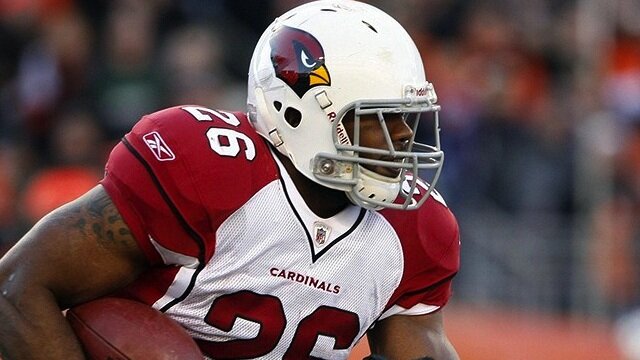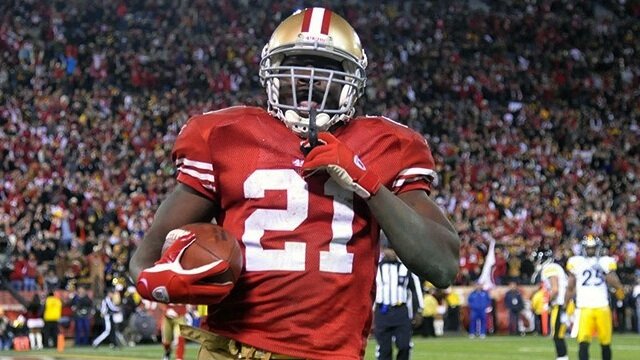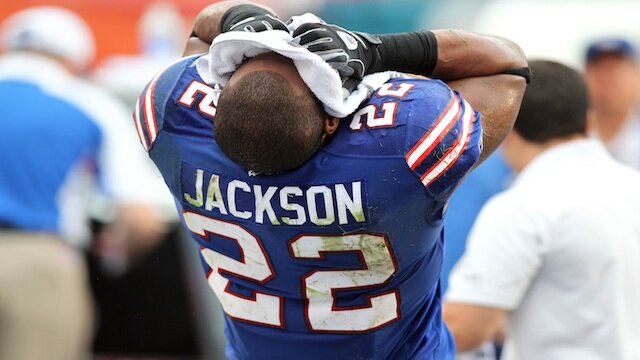Analyzing the Six Factors That Make a Fourth Quarter Comeback in the NFL Impressive

There is not a position in professional sports that receives more credit for a victory and more blame for a loss than the quarterback in the NFL.
Stats are important, but like it or not, a quarterback will ultimately be judged by his ability to win football games, and, especially over the last few years, nothing has received as much attention and praise as a fourth quarter comeback.
Whether it’s Tim Tebow in any of his six heroic victories last season or Eli Manning against the New England Patriots in the Super Bowl (twice), fourth quarter comebacks are where legends are made in the National Football League.
Below I will address the factors that make a fourth quarter comeback impressive, as compared to the factors that make it ‘just another win.’ And for each factor, I will give an example of when it is very impressive and when it is not so impressive.
1) Did the quarterback lead his team to a lot of points in the game?
This is the most important factor in judging a fourth quarter comeback. How many points did the team score throughout the game?
An average NFL team scores approximately 22 points in a game. So if a team wins a game 17-14, highlighted by a fourth quarter comeback from the winning quarterback, that’s still a win, but I fail to see why the quarterback is the hero. The defense should be the hero, for only allowing 14 points all game and giving the offense a chance to win the game at the end.
Leading a team to points is the most important thing a quarterback can do.
Let me give you two examples here.
When It Is Impressive:
Last year’s NFC divisional playoff game between the San Francisco 49ers and New Orleans Saints was one of the most entertaining football games I have ever watched. The 49ers won 36-32, and quarterback Alex Smith deserves a tremendous amount of comeback for his fourth quarter comeback because he led the offense to 36 points. That’s significantly higher than the average amount in a game. Had Smith led the 49ers to just 29 points, his performance still would have been impressive, because 29 points should win at least 75 percent of NFL games. But when Smith got the 49ers to 36 points, victory was all but assured. Major points to him and the 49ers for winning a shootout.
When It Is Not Impressive:
I could pick many examples for Tim Tebow with the Denver Broncos last year, such as the 13-10 victory over the Chicago Bears in which the team did absolutely nothing with the ball for the first 57 minutes, or the 18-15 victory over the Miami Dolphins, in which the team also did absolutely nothing with the ball for the first 57 minutes.
But I’m going to focus one of the most famous game-winning drives in NFL history. That would be the miracle drive that Eli Manning led the New York Giants on to defeat the New England Patriots 17-14 in Super Bowl XLII.
Purely from a scoring perspective, that drive does not impress me. That game was the biggest of Eli Manning’s life. Am I impressed that he led the Giants to 17 points? No. Should his team have lost the game? Yes. Why didn’t they? I believe that the biggest factor was the play of the defense, which held the highest scoring offense in the history of the NFL to just 14 points.
I am not trying to take away Eli Manning’s Super Bowl victory. Beating the Patriots was very impressive but it was impressive for the TEAM.
I am surprised that nobody has ever mentioned that Eli could only lead his team to 17 points, a below average figure, in the biggest game of his life. You could apply the same to the 21 points that the Giants scored against the Patriots in this year’s Super Bowl. 21 points is slightly below average in an NFL game, yet it was enough to win, and because the winning points came on a last-second drive, Eli Manning has received a lot more praise than if the Giants had won a ‘boring’ 31-17 game. That’s not fair but it’s true. By scoring fewer points and doing it at the right time, Eli Manning actually helped his reputation more than if the Giants scored the league average 22 or 23 points and they all came in the first three quarters.
2) Did the quarterback have to respond to a go-ahead score by the opposition?
Did the quarterback need to strap on his helmet and lead his team to points immediately after the other team scored? Or did he have all game to score the go-ahead points and they happened to come in the fourth quarter?
Let’s go with two more examples.
When It Is Impressive:
I’m going to go back to the 49ers-Saints playoff game from last season because I just can’t get enough of how great this game was.
All these two teams did in the final four minutes was score touchdown after touchdown after touchdown after touchdown. When Drew Brees threw a 44-yard touchdown pass to running back Darren Sproles with just 4:02 remaining, the Saints took a 24-23 lead. But Alex Smith responded, leading a six-play, 80-yard drive that took just 1:50 off the game clock. The drive ended with Smith dashing in, untouched, for a 28-yard touchdown that gave the 49ers the lead back.
Then Brees and the Saints responded, driving 88 yards on four plays in 34 seconds, retaking the lead, 32-29, with just 1:37 left. And, incredibly, Smith and the 49ers responded AGAIN, driving 85 yards in seven plays to score the winning touchdown with just nine seconds remaining. I have no doubt in my mind that if the game had continued for two more minutes, Brees and the Saints would have found a way to win.
Other examples of quarterbacks responding to an opposition score include the Tom Brady and Jake Delhomme in Super Bowl XXXVIII, and Ben Roethlisberger and Kurt Warner in Super Bowl XLIII.
When It Is Not Impressive:
I love the guy, but let’s pick on Tim Tebow here. Remember the incredible 13-10 comeback victory that Tebow and the Broncos had over the Chicago Bears in week 14 of the 2011 season?
Yeah. It wasn’t so incredible.
I’m not focusing on the fact that Denver only scored 13 points, which should never be enough to win a football game. I’m talking about the fact that the Bears added a field goal to take a 10-0 lead just a few seconds into the fourth quarter. The Broncos had the entire fourth quarter to take the lead.
Instead, they scored all 10 points (to force overtime) in the final 2:08 of the fourth quarter. In overtime, they won on a field goal.
Had the Broncos won the game 20-10 by evenly distributing the 20 points throughout the fourth quarter, the victory would not have received nearly as much attention. It would actually be considered less impressive, despite the offense scoring seven more points.
3) Did the quarterback lead the comeback without benefiting from any lucky plays?
When a quarterback leads his team to a game-winning drive, especially in the final few minutes of the game, luck usually plays a big role. That’s not discrediting the quarterback one bit. It’s really not. But in a close game in the NFL, one lucky play for either team can be the difference.
Let me try to give some examples to explain my point.
When It Is Impressive:
Let’s go with Joe Montana leading the San Francisco 49ers to a 20-16 victory over the Cincinnati Bengals with a 92-yard drive in the final three minutes of Super Bowl XXIII. That drive was a work of art. It was masterful. It was as efficient as Montana can play, and that’s saying something.
And you get the feeling that the 49ers could have gone 200 yards, instead of just 92, if they needed to. They didn’t benefit from a 63-yard catch and run. Nobody dropped an interception. Montana didn’t fumble and have an offensive linemen fall on his fumble. He didn’t benefit from a 46-yard pass interference penalty. He didn’t complete just 3 of 8 passes.
He completed 8 of 9 passes for 92 yards, and he actually led the 49ers an extra 10 yards because of a 10-yard illegal man downfield penalty on center Randy Cross. That’s efficient, remarkable, and extremely impressive.
When It Is Not Impressive:
I could give so many examples here. I understand that football is going to have lucky plays throughout the course of a 60-minute game. But when it happens with the game on the line, it sometimes gives the quarterback a little bit more credit than he deserves.
Let’s go back to Eli Manning and the Giants in Super Bowl XLIII. Manning benefited from four extremely lucky breaks in that drive.
1) The Giants earned 50 seconds by the refs’ poor clock management. In fact, the refs actually saved them from having to use their third timeout after running back Brandon Jacobs ran for a first down on fourth and one, and they failed to start the clock on time multiple times.
2) Eli Manning recovered his own fumble after Patriots linebacker Adalius Thomas stripped him. I’m not saying that the Giants didn’t deserve to recover their own fumble. But yes, it was a lucky break for Manning and the Giants.
3) Just one play after Manning’s fumble, Patriots cornerback Asante Samuel dropped what should have been a game-winning interception. That would have clinched a perfect season for the Patriots. Think about that. Manning should have thrown a interception (the ball should have been caught) and the fumble easily could have been recovered by the Patriots. That’s twice on the final drive that he almost turned the ball over.
4) I’m going to combine this into one, although I could make this two. You could argue that Eli Manning should have been whistled dead when he was trying to break out of the grasp of a pair of Patriots’ defenders, although I agree with the decision to keep the play going. Then came arguably the luckiest catch in league history, as wide receiver David Tyree pressed Manning’s desperation heave against his helmet for a 32-yard completion. Again, the play definitely should count. I’m just not sure if I’ve ever seen a luckier play in a more crucial situation.
Other examples of incredibly lucky plays to win games include Franco Harris and the Immaculate Reception for the Pittsburgh Steelers against the Oakland Raiders in 1972, where a) the ball was probably touched by running back Frenchy Fuqua, which was illegal at the time, b) the bounce directly to Franco Harris is probably the luckiest bounce on any ball in history, and c) there was no clipping penalty called on Steelers’ tight end John McMakin, even though video replays clearly show him diving into the back of the legs of Raiders’ linebacker Phil Villapiano. An incredible win for the Steelers and Terry Bradshaw? Yes. But lucky? Very.
Other examples of lucky breaks include Tom Brady and the New England Patriots benefiting from the 45-yard field goal from kicker Adam Vinatieri, arguably the greatest kick in NFL history, to force overtime against the Oakland Raiders in the 2001 AFC divisional playoff game, and Eli Manning and the Giants, who twice benefited from an overtime turnover in good field position in a conference championship game.
To recap, there’s nothing wrong with a lucky break on a crucial play that ends up winning the game. Eli Manning, Terry Bradshaw, and Tom Brady deserve credit for their late-game heroics.
But what impresses you more: a slow, methodical march down the field to win the game, or one lucky heave, four tips, and a touchdown catch? The tipped touchdown is a lot more entertaining. But the slow march is more impressive by the quarterback.
4) Did the quarterback start the drive knowing that it was do-or-die?
There are two kinds of comebacks: those that come with 11 or 12 minutes left in the game, when the pressure is not as intense, and those that come in the final couple of minutes of the game, when it’s truly do-or-die.
When It’s Impressive:
It would be only fair that I praise Eli Manning’s game-winning drive in Super Bowl XLII after downplaying his accomplishments earlier.
Eli Manning’s game-winning drive to beat the Patriots in Super Bowl XLII (the first of his two) was extremely impressive because he and the Giants got the ball knowing that if they did not score a touchdown on that particular drive, the game was over. You talk about pressure. The Giants felt it, and they came through, including a huge fourth and one conversion.
When It’s Not Impressive:
In Super Bowl XLV, Drew Brees and the New Orleans Saints used a fourth quarter comeback to defeat the Indianapolis Colts 31-17. But in my book, it barely counts as a fourth quarter comeback.
I give Brees a tremendous amount of credit for leading the Saints to 31 points, an impressive total considering the Super Bowl was the biggest game of his life. But he didn’t need to lead a last-minute 84-yard march down the field. He threw the go-ahead touchdown pass, which proved to be the game-winner, to tight end Jeremy Shockey with 5:42 left. Props to Brees for leading a go-ahead score in the Super Bowl.
It was just your typical boring fourth quarter comeback that occurs at a random point in the fourth quarter and not with just a few seconds left on the clock. And there’s nothing wrong with that. It just won’t be remembered by fourth quarter comeback lovers in the same way that Eli Manning’s will.
5) Did the quarterback need a touchdown or a field goal to win the game?
The difference between needing a touchdown or a field goal to win a game? Huge.
Let’s analyze.
When It Is Impressive:
I can’t stop analyzing Eli Manning, so let’s stay with him.
His drive against the Patriots to win Super Bowl XLII? Extremely impressive in the fact that the Giants began the drive knowing that a field goal would do no god. They needed a touchdown.
In fact, Cold Hard Football Facts points out that it is the only time in championship game history that the game-winning touchdown was scored in the final minute by a team that would not benefit from a field goal.
That’s clutch. Super clutch.
When It Is Not Impressive:
Any instance in which a quarterback becomes a hero after leading a game-winning drive that results in a field goal is not as impressive to me. I could give you so many examples but the ones that fans focus on the most are Tom Brady and his Super Bowl wins.
In both Super Bowl XXXVI and Super Bowl XXXVIII, Brady led the Patriots to a game-winning field goal in the final seconds. But the drives really don’t compare to the all-time best drives in NFL history. The pressure of needing only a field goal when your team is tied is just so much different than needing a touchdown when you’re down by four.
6) Did the quarterback have to lead a long drive for the victory?
This will usually apply to whether a quarterback needed to lead his team to a touchdown or a field goal to win. After all, touchdown drives are longer, making them more impressive.
When It Is Impressive:
John Elway is the first name that comes to mind. His 98-yard drive to tie the game against the Cleveland Browns in the fourth quarter of the 1986 AFC championship game is a work of art. Elway literally had to march the Broncos the length of the football field. You cannot get more impressive than that.
When It Is Not Impressive:
The all-time classic example is Eli Manning and his conference championship game victories. In both games, the Giants deserve credit for winning the game, but I’m not sure if Eli Manning should be singled out at all, even though he did technically lead a game-winning drive. For in both games, the Giants used a turnover to begin their drive with the ball already in the opponents’ territory. Both times they needed just a field goal. That means Eli Manning could hand off three times and get credit for a game-winning drive, and that’s essentially what he did against both the Green Bay Packers in 2007 and the San Francisco 49ers in 2011.
Conclusion:
Scott Kacsmar did an incredible job with his research for Pro-Football-Reference, where he lists the fourth quarter comebacks of every quarterback in history. You’ll notice it now on any quarterback’s page on PFR on the right side of the page. It’s phenomenal.
But I think it’s important to keep in mind that not every fourth quarter comeback is created equal, although in the win-loss column, they are.
There are so many factors when evaluating fourth quarter comebacks, and they should all be taken into consideration.
In the future, I would like to assign a point value to each of the six categories.
For example, let me go back (one final time) to Eli Manning’s drive against the New England Patriots in Super Bowl XLII and recap how he would fair in each of the six factors.
1) QB leads team to a lot of points… Eli did not. 17 points is below average.
2) QB responded to go-ahead score by opposition… Eli did. Moss scored with 2:42 left.
3) QB led comeback without any lucky plays… Eli had a lot of luck (clock, fumble, INT, Tyree).
4) QB began drive knowing it was do or die… Eli did, and he came through to win a Super Bowl.
5) QB needed TD to win game, not FG… Eli did. A field goal would have been irrelevant.
6) QB led long drive for win, not short drive… Eli marched the Giants 83 yards. Long drive.
So Eli passed with flying colors on factors 2, 4, 5, and 6. He did not pass on factors 1 and 3.
I would have a lot of work to do before I assigned a point value, but if I did, factor number one–scoring a lot of points–would be at least half the credit. Maybe more.
You score a lot of points AND lead a fourth quarter comeback, and nobody can take anything away from you. That’s what truly makes a quarterback great.



